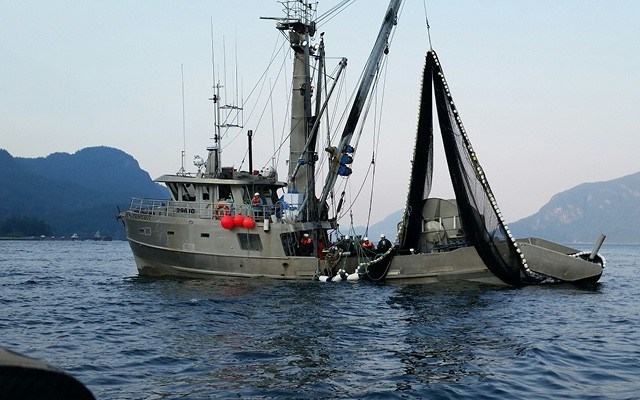It wasn't what was included in Ottawa's $1.5-billion Ocean Protection Plan announced last week that has drawn mixed reviews from local conservation groups, but rather what was left out.
The feds' five-year investment to restore marine ecosystems, research oil spill cleanup methods and improve partnerships with Indigenous groups was announced in Vancouver Monday, Nov. 7, with Prime Minister Justin Trudeau calling it "the most significant investment ever made to protect our oceans and coastlines."
But fisheries stakeholders in the region believe the Liberals' could have done more to move the dial on some of their earlier commitments.
"We still have the same Fisheries Act that was gutted by Stephen Harper and, despite promises from the Liberals one year into the mandate, we haven't seen that change," said Sea to Sky Fisheries Roundtable member Dave Brown. "Despite the ministerial mandate letter saying that they need to act on the recommendations of the Cohen inquiry, there's been no real action around that either."
Conservation groups were hopeful after an August announcement that Ottawa would follow up on the 75 recommendations included in the landmark 2012 Cohen Commission, which investigated the decline of sockeye salmon in B.C.'s Fraser River. But the government's lack of action one year into its term remains a concern, said Watershed Watch Salmon Society director Aaron Hill.
"I have mixed feelings," he said of the announcement. "We are seeing some improvements, for sure, but we're also seeing some things we're pretty concerned about. I think over the next year or so, if this government is able to show some serious leadership with the Department of Fisheries (DFO) and make good on their commitments in the mandate letter, and not just provide window dressing, (then) we will definitely be further ahead, and that will definitely be something to celebrate. But we're not there yet."
While Hill applauded Ottawa's commitment to fish habitat restoration, he believes that Trudeau's greenlighting of expanded LNG tanker traffic across B.C. runs counter to that goal. He was also disappointed last week's announcement included no mention of a proposed tanker ban on B.C.'s North Coast, although the government has assured that move is forthcoming.
"The Liberals are obviously trying to please both industry and First Nations and environmental groups. But the problem is there are lots of industrial activities that can take place with acceptable levels of harm to the environment," he said. "But this idea that we can clean up oil spills on the B.C. coast in the middle of a winter storm is ludicrous, and we need to do away with that notion." Part of the protection plan included a commitment to invest in spill cleanup research just weeks after a tugboat sank off B.C.'s Central Coast, releasing thousands of litres of diesel and lubricants into the water.
One of Hill's other major sticking points surrounds the government's inaction on the federal 2005 Wild Salmon policy, which was lauded by Justice Bruce Cohen in his report as an effective roadmap for salmon management. Fisheries minister Dominic LeBlanc has said the policy would be updated following further consultation to align with changes to the Fisheries Act under Harper — changes that were lambasted by the Liberals during last year's election campaign.
"It's pretty mind-boggling that they would use that as one of their primary reasons for (updating the policy)," Hill said. "They're going to strip that out and write a new implementation plan that we fear will have less accountability."
But Sea to Sky federal MP Pam Goldsmith-Jones assured that the delay in implementing the policy is to update the legislation since it was first introduced 11 years ago, not to align with Harper's gutted Fisheries Act.
"It will be strengthened," she said of the updated policy. "Of course it needs to be updated and it needs to be a powerful document."
Goldsmith-Jones also reassured critics that she is "certainly not dragging her feet" on the promises her government has made, but that it will take time to undo some of the changes the Harper regime made to fisheries management during its term.
"We have a lot of work to do, I'm certainly not denying that. But this is a 180-degree turn," she said. "I think it's really important to remember that we are restoring (policies) that people think should have never been cut in the first place. I appreciate the frustration on the part of the real advocates, but I would say government is going as fast as it can, and I'm happy with that."




